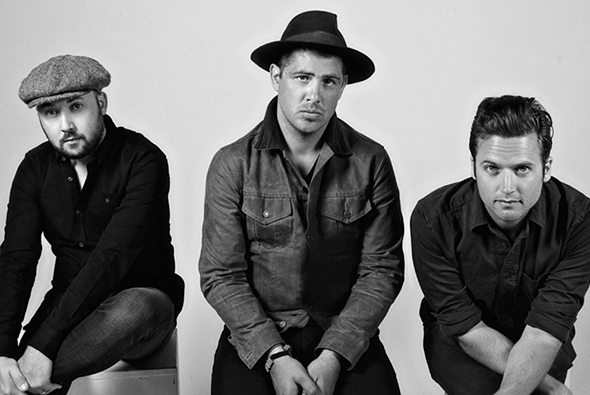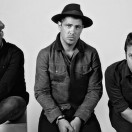
O&B contributor Sylvia Borgo interviewed drummer Rob Allen before Augustines‘ emotional February 13 show at the Soda Bar.
Sylvia Borgo: I’m interested in knowing the story of how you joined the band. You’ve been together for about three years now. What was it like to transition from the duo of Bill and Eric to a trio?
Rob Allen: When Bill and Eric were doing Pela, they wanted to start this new project called Augustines. The drummer of [Pela], Tom Zovich, suggested they call me and we met up. By then, the record had come out and there was a promise of a tour. Within a couple of weeks, we got set up and went out touring. We didn’t know how long we’d go, but we had an inkling, and we ended up touring for two years. Touring can be very hard. It is fun, but like anything you do, it has its ups and downs. Over two years we got very close and here we are.
Sylvia Borgo: It’s really nice to see you guys on stage, you are like a band of brothers.
Rob Allen: All three of us have been through every kind of situation imaginable in our careers, and to get a chance to do this, it really means a lot. And it is really genuine. We play each show like it is our last, and it really means a lot to be able to play our songs and interact with our audience.
I don’t think we can call them fans; they are our supporters. To be able to communicate with them is a very special feeling. We are very passionate and serious about what we do. We are fun-loving guys, too. Music is what makes us tick, and the fact that we get to do it together is a wonderful thing.
Sylvia Borgo: You’ve been playing drums for a long time. How long did you study in England, and how did you find your way to the U.S.?
Rob Allen: I was professionally taught. I started playing when I was six. Then through music college, I got a chance to study at a conservatory in Norway. When university finished, I was playing with a bunch of guys and we had the opportunity to record on a label, and had the opportunity to do a lot of work in the states. I ended up just really liking the states and built a life here. I really loved playing in America. It is funny that when you go to a new place and you just get up and start your life. That is really what happened.
Sylvia Borgo: After the last tour, you started working on Augustines’ latest, self-titled album. What was that process like?
Rob Allen: Yeah, we were touring for quite an extensive amount of time, and what happened was the first album had some very deep subject matter, and this subject matter had a long tail, kind of swinging around.
People were coming out to our shows and singing back; singing the lyrics became a very positive thing. Sure, the subject matter was deep, but we were getting a very positive reaction from the crowds. It was such a wonderful feeling. We were keen to harness our energy — and all the energy we got from the people singing along — for the next record.
We had 10 days off and went to an old church in upstate New York, and we basically set up there. It was the worst weather they’d had in quite some time, and it really worked in our favor. We were really able to buckle down, wake up early, write all day, make dinner, go to bed, and do it all over again.
So it was five weeks of that, and as we came out of it, we went into the studio with Pete Katis (Frightened Rabbit, The Twilight Sad, We Were Promised Jetpacks). We’ve always been big fans of his, so we rang him up. We gave him all the songs that we had created, and we tracked a lot of them and whittled it down to what the record is today.
Sylvia Borgo: Can you talk just a little bit about your drumming on the album?
Rob Allen: When you approach a record or you approach music, it is like being in a relationship. You really feed off the other people; you really get to know how Billy and Eric express themselves musically, so you already know how to approach it.
The way I approach music is that I don’t try to overplay. I try to be very tasteful, if I can. And we did experiment with some different stuff. We experimented with some different layering, and we experimented with how I recorded the drums. We played around with different bits and pieces to bring out the song, to keep it solid and make sure that my emotion and my expression was put in the right place at the right time.
Sylvia Borgo: So, today marks the 50th anniversary of The Beatles coming out to US and playing the Ed Sullivan show. I had a big argument with a friend about whether or not Ringo was a good drummer. Can you tell me what you think about that?
Rob Allen: [Laughs] Oh, you are getting me in trouble here. I don’t want to upset anyone. There are a lot of stories about Ringo and some of them are true and some of them are not, and it is hard to know what’s true and what is not.
So, what I’m about to tell you kind of influences my feelings towards Ringo. Apparently — and this, again, I don’t know if it is true or not, and really it has never been proven as something that can be believed — but some say that Ringo didn’t record on some of the later records. But let’s just say for now that Ringo did record on everything. If that is the case, I would say he is a very, very good drummer. His drumming is exceptional; he is very tasteful, very musical, someone who grooves. On the earlier stuff, some of the drum beats he came up with, he really got you dancing. He really got you moving, he had the personality, the charisma, he was a great showman. He was a great drummer. Now the thing about someone else recording on the later records, I think some of his greatest drumming was on the later stuff. I don’t know anyone who would think he wasn’t [a great drummer].
Sylvia Borgo: I promise you I will not get you in trouble with anyone.
Rob Allen: Thank you, thank you for that.
Sylvia Borgo: What are you listing to right now? What do you guys listen to on tour?
Rob Allen: We listen to all sorts of stuff. We do have eclectic tastes; there is a lot of world music that we listen to. There is a guy named Simon Diaz. There is a band that I’ve been listening to, they are very underrated, a British band called XTC. They are like a guilty pleasure for me. We listen to so much music, from the 80s, 90s, whether it is modern or from the 20s, or classical.
When I was growing up, teachers were always saying to me, “The best piece of advice I can give you is listen to everything even if you don’t like it. Even if you don’t think you are going to get into it, listen to it. There will always be something you can pick up that you haven’t picked up before.†And that is the truth.
Edited for clarity
